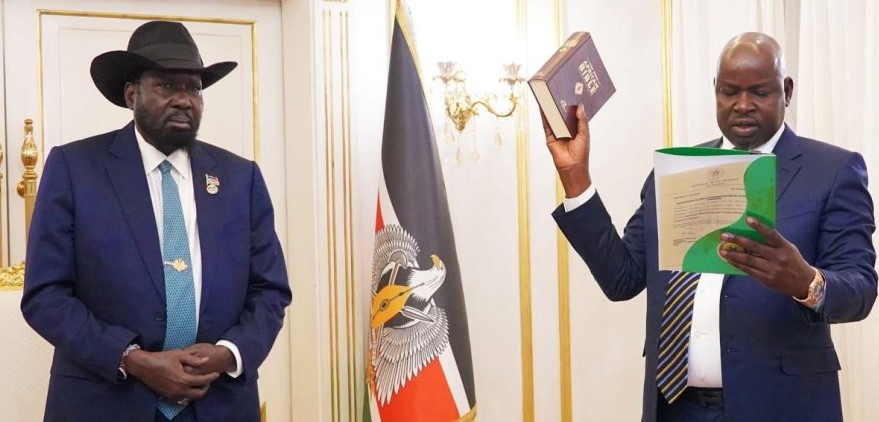Dr Benjamin Bol Mel’s appointment as the SPLM’s First Deputy Chairman has ignited intense debate, particularly between the Aweil and Warrap communities. While some view his rise as a generational shift in leadership, others argue that he represents a continuation of South Sudan’s entrenched governance practices, marked by corruption, suppression, and nepotism.
Since South Sudan’s independence, the SPLM leadership has struggled to uphold the principles of justice, liberty, and equality—values that fueled the liberation movement. Instead, governance has been characterized by power struggles, factionalism, and economic mismanagement. Many South Sudanese had hoped for meaningful change after President Salva Kiir’s tenure. Mel’s appointment as the First Vice-President has raised concerns about whether he will bring reform or perpetuate the status quo.
A key issue surrounding Bol Mel is his business dealings with the government, particularly through ABMC Thai-South Sudan Construction Company, which has secured billions in government contracts without competitive bidding. His name has also been linked to corruption allegations, with the US Treasury Department sanctioning him for misappropriating public resources. Given South Sudan’s ongoing battle with corruption, many question whether Mel can effectively combat these issues, or if his leadership will reinforce the governance failures.
Critics argue that questioning Mel’s leadership is not an attack on the Aweil or his community, but rather a citizen’s right to scrutinize future leaders. However, his supporters have framed criticism as tribal bias, discouraging open discussions about his qualifications and leadership capabilities. Instead of presenting a convincing record of Mel’s political, business, military, and leadership achievements, they have opted to shift the focus toward accusations of regional hostility. This approach undermines constructive political discourse and discourages meaningful conversations about governance and leadership integrity.
The controversy escalated following remarks from Gen Aleu Ayieny, a former Governor of Warrap State and a senior SPLM member, who cautioned that Mel should not assume he would automatically replace President Kiir. His statement was intentionally misinterpreted by some as opposition to Aweil, despite being a political observation rather than a personal attack. Ayieny, known for his direct and often humorous speech style, has previously made bold statements reflecting deep-seated concerns about SPLM’s leadership transition.
Instead of addressing questions about Mel’s qualifications and leadership capabilities, some supporters have chosen to dismiss scrutiny as tribal bias, silencing legitimate concerns about governance and accountability. This tactic diverts the conversation from the core issues facing South Sudan, such as economic recovery, institutional reform, and anti-corruption measures.
South Sudan’s leadership transition remains uncertain, with succession politics often dictated by power struggles rather than structured governance. If the SPLM is to remain a people’s party, its leadership must embrace transparency, accountability, and meaningful reform. Mel and his supporters must recognize that public scrutiny is essential for shaping a leadership that truly serves the people.
The people of South Sudan fought for liberty, justice, and equality, yet the SPLM leadership has failed to fully deliver on these ideals since independence. Citizens have the right to question their future leaders and reject any continuation of failed governance practices. If Mel represents the current state of affairs, then his acceptance or rejection should be seen as a genuine political consequence, rather than an act of personal or regional bias. South Sudanese desire leadership that will bring meaningful change, and if they perceive Mel as an extension of the system, they have every right to challenge his suitability for leadership.
SPLM and its leadership must recognize that citizen participation in governance is a fundamental right, not a threat. If South Sudanese question leadership, it is not out of hatred but out of a desire for better governance, transparency, and real change. Leadership must be earned through competence, integrity, and a commitment to the people, not through appointments dictated by power dynamics alone.
South Sudan cannot afford another cycle of failed governance, corruption, and political maneuvering. If Mel and his supporters truly wish to prove his leadership worth, they must address legitimate concerns, present his qualifications transparently, and engage in meaningful discourse, rather than dismissing criticism as tribal hostility. Only then can South Sudan move toward a leadership built on trust, merit, and national unity.
The writer , Morris Kuol Yoll, is a South Sudanese Canadian who resides in Alberta, Canada, and can be reached at: myoll2002@yahoo.com
The views expressed in ‘opinion’ articles published by Radio Tamazuj are solely those of the writer. The veracity of any claims made is the responsibility of the author, not Radio Tamazuj.




